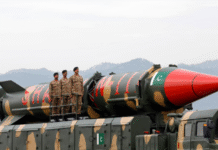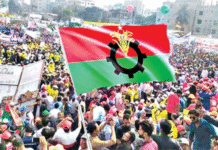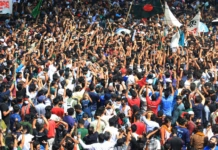Role Of BSF In Liberation Of Bangladesh

The Border Security Force (BSF) contingent that proudly marches down Rajpath as part of the Republic Day parade belongs to a Central Armed Police Force of India which played a critical but little-known role in the 1971 war for the liberation of Bangladesh.
The BSF comprises a sizeable 186 battalions (about 245,000 personnel) and is one of the finest security forces in the world. It has its own Air Wing, Water Wing, Artillery, Intelligence set up, and camel / horse mounted troops besides normal troops.
The BSF was only about five years old when K.F. Rustamji (the first Director General of BSF) was called by then Prime Minister Indira Gandhi and tasked with an onerous responsibility — and the force rose to the challenge.
The PM authorised the Border Security Force (BSF) to take on Pakistani troops in erstwhile East Pakistan, several months before the India-Pakistan war erupted on December 3, 1971. She said: “Do what you like, but don’t get caught.” A little later, on March 29, 1971, the then Indian Army Chief, General S.H.F.J. Manekshaw (later Field Marshal) issued orders that BSF was to provide limited assistance to the Bengali guerrillas who were pitted against the Pakistani troops.
Thus, the BSF entered the scene during a surcharged atmosphere and amid rising expectations. Initially a secret party which consisted of some handpicked energetic officers and about 100 men well versed in commando raids, demolition, etc. was prepared. This party was organised to carry out tasks in support of the freedom struggle by the people of East Pakistan. The aim was to provide aid to the freedom fighters to carry out their assignment successfully.
On March 30, 1971, when Major Ziaur Rahman (Maj Zia and his troops had defected from Pakistan Army and had become Mukti Bahinis) could not continue to broadcast the message for his countrymen on behalf of Sheikh Mujibur Rahman from a radio station near Chittagong, a one kilowatt radio transmitter was established inside BSF Battalion HQ in Bagafa in South Tripura, in the officers’ mess.
Major Ziaur Rehman (who later became Army Chief and President of Bangladesh), along with Superintendent of Police Rangamati District (East Pakistan) and his two daughters, crossed over to India through Belonia in Tripura and was received by A.K. Ghosh, Commandant Bagafa BSF Battalion. They were then brought to Bagafa.
On April 3, 1971, they restarted the broadcast from Bagafa Transmission Station. Initially both the daughters of Superintendent Police Rangamati sang devotional songs and this was followed by a motivational speech by Major Ziaur Rehman to his countrymen. This transmission station used to broadcast every day at a given time.
Later, Major Ziaur Rahman was escorted to BSF HQs at Agartala and introduced to other senior BSF officers. After some time, a proper transmission station was constructed near BSF Frontier HQs Salbagan Agartala and further broadcast was carried on from this station with effect from May 25, 1971.
One of the key contributions by the BSF was to impart training to the Mukti Bahini, valiantly known as “Freedom Fighters”, who represented the armed organisations fighting against the Pakistan Army during the Bangladesh Liberation War. They comprised primarily Bengalis of erstwhile East Pakistan.
Side by side, the BSF officers and men started assisting the Mukti Fauj (later Bahini) in causing subversion and sabotage deep inside East Pakistan and even in district headquarter towns. The civilian population of Bangladesh was full of enthusiasm, working towards the liberation of the country. Volunteers were joining the ranks of the Mukti Fauj by the thousands. In this dynamic environment, BSF’s guidance and organisational skills provided the requisite support.
It was not long before BSF officers contacted the most senior leaders of the Awami League party — Tajuddin Ahmad and Amirul Islam — who had survived the massacres by the Pakistani forces. They had walked across from Dacca (Dhaka). They were immediately taken to Golok Majumdar, Inspector General BSF, Bengal Frontier, at Kolkata.
The BSF played a key role in the formation of the Bangladesh Provisional Government, in framing its Constitution and in selecting a National Flag. The BSF also contributed to the defection of Pakistan’s Deputy High Commissioner in Kolkata – the first instance of its kind.
The Revolutionary Government of Bangladesh initially started functioning from the BSF Frontier HQs Kolkata. Later they were shifted to a nearby building on Theater Road near British Council Building. This was called as Mujibnagar.
Prior to Bangladesh independence, eight postage stamps were released with different motifs by the then Revolutionary Government of Bangladesh on July 29, 1971 simultaneously from the Mujibnagar Mission located in Kolkata, London, and on Bangladesh soil opposite Nadia District in an area which had been liberated with the help of the BSF. The same day, these stamps were also released in India.
The ceremony inside Bangladesh soil had been organised by the BSF. Since Bangladesh was not yet liberated at that time, these stamps were referred to as propaganda issues. But later, after liberation they became the first issues of Bangladesh postage stamps.
The BSF acted as the link between civil and military authorities and kept them ‘clued-in’ regarding the overall situation. Even while fighting fiercely against the Pakistani troops, the force also had to manage the thousands of refugees pouring into India from all corners of Bangladesh. They were evacuated and provided shelter. BSF doctors worked round the clock to render assistance, particularly against epidemics.
Finally, on December 16, 1971, Lt. Gen A.A.K. Niazi, Commander of the Pakistan Army in East Pakistan, signed the Instrument of Surrender and the war finally ended. Whatever BSF is today is all because of a strong foundation laid by its officers and men, the ‘Unsung Heroes’.
*Anil Kamboj retired as Inspector General from the BSF and is now Professor at New Delhi Institute of Management. Comments and suggestions on this article can be sent to editor@spsindia.in









